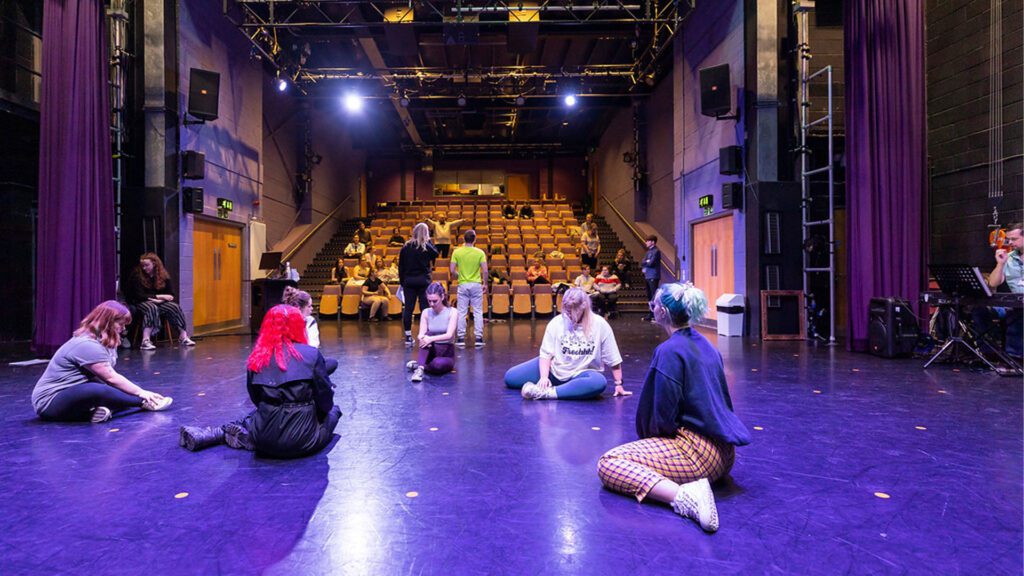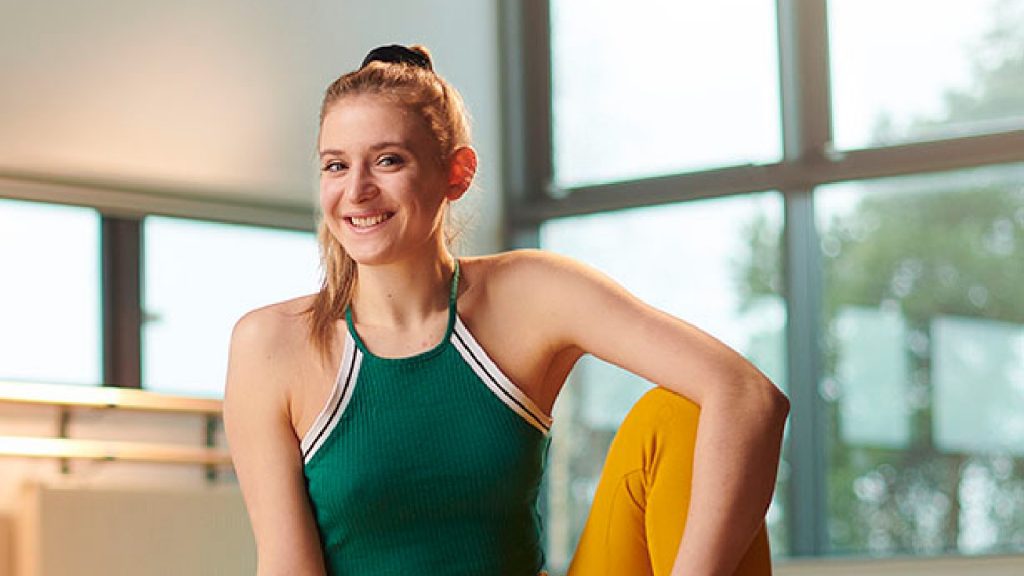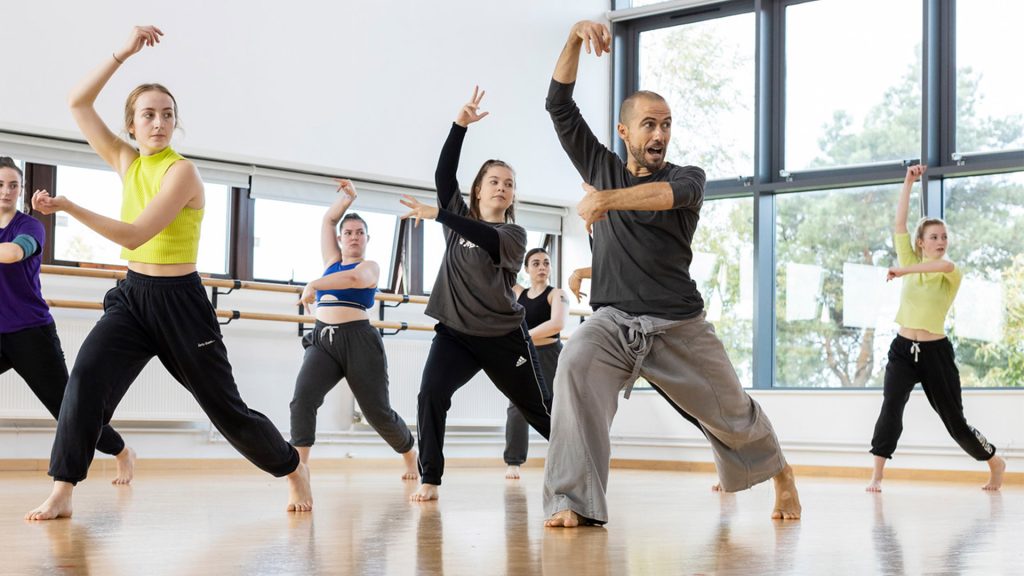How do I become a professional dancer?
There are many routes into becoming a professional dancer including studying a dance course at university. Read the steps to becoming a professional dancer, as well as a Q&A interview with two professional dancers, Michelle Man and James Hewison.
The BBC’s Strictly Come Dancing has helped to popularise the classical dancing scene, spotlighting the blood, sweat and tears required to bring even the most basic American Smooth, cha-cha-cha, or Viennese waltz to the dancefloor.
But we know that dance has long since pushed past those classical boundaries. It’s now an integral tool at the disposal of any cultural producer looking for new ways to tell a story. Those fight scenes in films from the Marvel and DC universes can be almost balletic. Not, I think, a coincidence.
“Gotta dance,” sang hoofing legend Gene Kelly in Singin’ in the Rain, as his character navigated New York’s theatre scene in search of work. It’s a familiar tale of a young person chasing their stage dream in the bright lights of the big city.
And it begs an obvious question: how do you turn a passion for dancing and choreography into a career?
Steps to becoming a professional dancer
There are many routes into becoming a professional dancer, but we’ve broken it down into a few easy-to-understand steps.

1. Get qualified
While it’s possible to get a job in dance without a qualification, if you’re serious about pursuing it as a career, then a professional qualification will definitely help. It’s one of the most common routes into dance as a profession.
A university degree, such as Edge Hill’s BA (Hons) Dance, will not only show future employees that you’re serious about Dance, but also will teach you much wider, theory-based skills required in professional work. You could also choose the route of a diploma or a related degree such as BA (Hons) Musical Theatre.
2. Start auditioning
This is a key part of becoming a professional dancer. You won’t get a job without auditioning and it can be tough, especially at first. dance careers are competitive, but staying dedicated and persistent, taking on feedback and showing resilience will help you to land your first job. The more auditions you do, the more confident you will become.
3. Network
Who you know can play a big part in finding out about jobs and getting hold of audition opportunities. Go to networking events, keep an eye out on relevant social media platforms (you can network online remember!) and take opportunities when they come your way.
There are organisations such as One Dance UK and Equity that you could join. These can help you to network and make contacts in the industry.
4. Keep auditioning
The more professional experience you have, the better a prospect you will be to future employers. It can take a lot of auditions before you land that perfect job or role, so keep at it and take on board any feedback you get.
5. Consider getting an agent
While an agent isn’t essential for becoming a professional dancer, it could give you the edge in finding auditions and contacts – especially in such a competitive industry. You might get access to auditions that aren’t open to the general public.
An agent can also help you refine your CV and portfolio to hone in on the roles that most interest you.
6. Pursue your passions
You might find you have a passion for teaching dance, being on the stage, being on film or any other number of specialities. Considering where your interests lie will help you to refine your future career in dance.
To give us more information on becoming a professional dancer, we’ve spoken to the tutors in the dance department at Edge Hill University? Senior lecturers – and professional dancers – Michelle Man (MM) and James Hewison (JH), alongside Edge Hill graduate-turned-lecturer Louisa Robey (LR).
What does a professional dancer do?
MM: A professional dancer will dedicate a significant portion of their time to rehearsing and preparing performances. They’re driven by their passion, so will often be delivering outreach workshops as part of the job or be involved in other aspects of dance such as choreography, promotion, making videos, and working in events. It’s also important for a professional dancer to continue their own training, to keep their skills and abilities up to the highest level, so they’ll often take classes with other artists and professionals.
What dance styles and techniques can I specialise in?
JH: Where to start? Contemporary, commercial, all-rounder in entertainment, street dance, African or Asian dance, working in education, in Arts for Wellbeing, and a very, very select few become ballet dancers. Many dancers have a portfolio career combining their performance work with teaching, creative projects, and admin for their company or their own work.
What skills and attributes are required to become a dancer?
LR: You need passion, commitment, and focus. You need to be prepared to dedicate many hours of the day to your profession. You also need to be open to working with different people, and to opportunities to continue building up your skills-set.
MM: Perseverance and self-awareness are key, as you’ll always be developing your technique and qualities as an intelligent dancer, who knows how take care of their instrument – the body. Good communication skills are an advantage as being a dancer is very much about working with and for people from very different walks of life, and with differing artistic visions. You will also need physical and mental stamina to manage your career.
LR: Practice, reflect, learn, network, repeat!
Do I need a qualification to become a dancer?
JH: Depending on your career route, a university dance degree will open up your options and allow you to develop and mature as a dance artist in many contexts. You could also consider a musical theatre degree, depending on your goals and interests.
How do I get dance experience?
As you’re training to become a dancer, you’ll have the chance to meet and workshop with many different artists and companies. This can lead to performance opportunities. And as a young developing dance artist, it’s important to get experience alongside professionals in the work environment that you aspire towards. As university tutors, we’ll facilitate connections and opportunities for you to get real life experiences.

Dance auditions
Auditioning is a key element of being a professional dancer or performer. With years of experience, our resident experts know what you can expect from the process. And how to improve your chances of success.
To work as a dancer, will I have to audition?
MM: There are different ways of going about getting a dance job. By audition, or by interview if you’re going to be working in an educational, community or health setting. Networking is key. This helps you establish contacts and get to know people who are passionate about the same types of dance as you.
What does an audition for a dance degree look like?
JH: A typical audition for Edge Hill University’s dance degree is around 1.5 hours and involves a contemporary-based dance class and a creative/choreographic session. There’s also an opportunity for candidates to ask questions and put over their thoughts and experiences in dance with staff and current students.
What does a professional dance audition process involve?
JH: A typical professional dance audition can either be open or by invitation only. An open audition starts with a general ‘call out’, and may stipulate some parameters, for example an expected level of experience, or particular skills in certain styles of movement or performance. This open call will usually result in a room full of people, all eager to catch the eye of whoever is casting. These sessions (I’ve run a few!) in most instances progress by a process of elimination. So, a gradual whittling down of the larger group to smaller cohorts, until there are just a few people left. Depending on the size of the company, these people may then be asked to come back for further recalls – sometimes doing a period of R&D [research and development] with existing company members before final decisions are made.
MM: The invitation-only audition would be where the company asks people to submit CVs and/or short performance showreels in advance, and they then create their own shortlist from that pre-submission. The practical audition itself, then, starts with a smaller group of people and so it’s maybe less of a ‘market’.
JH: For me, though, (and others may disagree), auditions are the least-best way to get a job – especially open call auditions! Much better is networking – getting your name and reputation known through your existing work and by making new contacts. This is why we encourage our students to take advantage of all the extracurricular workshops and opportunities that the team work so hard to create.
LR: And if you attend a visiting company or artist’s workshop and make a good impression, you may not need an actual audition (it ‘is’ an audition, in effect). Or they’ll remember your face if you do subsequently walk into an audition room – you’re already ‘in credit’.
More audition tips from Edge Hill staff and students
How long does it take to become a professional dancer?
LR: The pathway to becoming a professional dancer or dance artist is different for everyone. For example, a university degree will take around three years. But the time it takes to become a professional very much depends on your dedication, your capacity to work hard, and your flexibility to learn from different teachers and artists. Some people go on to make a business out of dance as trainers, dance teachers, or coaches, combining this with a performing career.
JH: Don’t forget to record your achievements and experience. Look at standard professional models for CVs and showreels – they’re widely available online. Follow formats and be clear, clean and precise, and honest. Don’t make the person who is hiring have to work hard to ‘see’ you (they won’t!). Avoid blurry images or poor-quality video footage.
How did you start your own performing career?
MM: By recognising my own talent and passion for the subject, and by pursuing that, alongside the encouragement of some great teachers and peers.
What are the typical career path and progression opportunities?
JH: A typical career path for a dancer will vary significantly depending on the dancer’s area of expertise and interest. The longer you work in any career, the more invested you can become in the profession and more people will get to know you and recognise your merits. This can lead to you taking on different roles as a dancer, such as dance captain, choreographer, youth dance leader, or even running your own dance projects or school.

Read Maria's story“I was a member of Edge Hill’s Undergraduate Dance Company. I’ve worked with international choreographers and music professionals, performed at festivals and events across the country, and appeared in a couple of music videos.”
Maria Mortimer BA (Hons) Dance
What’s an average day for a dancer?
LR: One of the exciting things about being a dance artist is that your days may be very different. From taking class to rehearsing, performing, workshopping, administration and teaching. Into all of this you’ll need to build in warm-up, cool down and stretching time to take care of your body.
How much can professional dancers earn?
But as a general guide, Equity, the trade union for the performing arts, has negotiated minimum weekly pay rates with the Independent Theatre Council (ITC). Minimum weekly pay rates for a commercial theatre production are £367.20 to £497.25, depending on the capacity of the venue. If you land that prize role on the West End, things can change dramatically. West End theatre performers can command a weekly rate of £583.38 to £834.49, depending on the size of theatre. And as we mentioned, dance has now become a part of many filmmakers’ lexicon, so you can earn a minimum of £882 per week for film work, rising to £2,234.40, depending on the overall film budget. And if you’re headhunted or commissioned to choreograph something, well, maybe time to think about those diamond-studded dance shoes.
What’s the phrase? 10% inspiration, 90% perspiration. Like anything, the harder you work at something, the better you’ll get. And you’ll get noticed, especially if you’re making contacts and networking. Luck will inevitably play a part, but hard work tends to bring its rewards.
November 21, 2022

